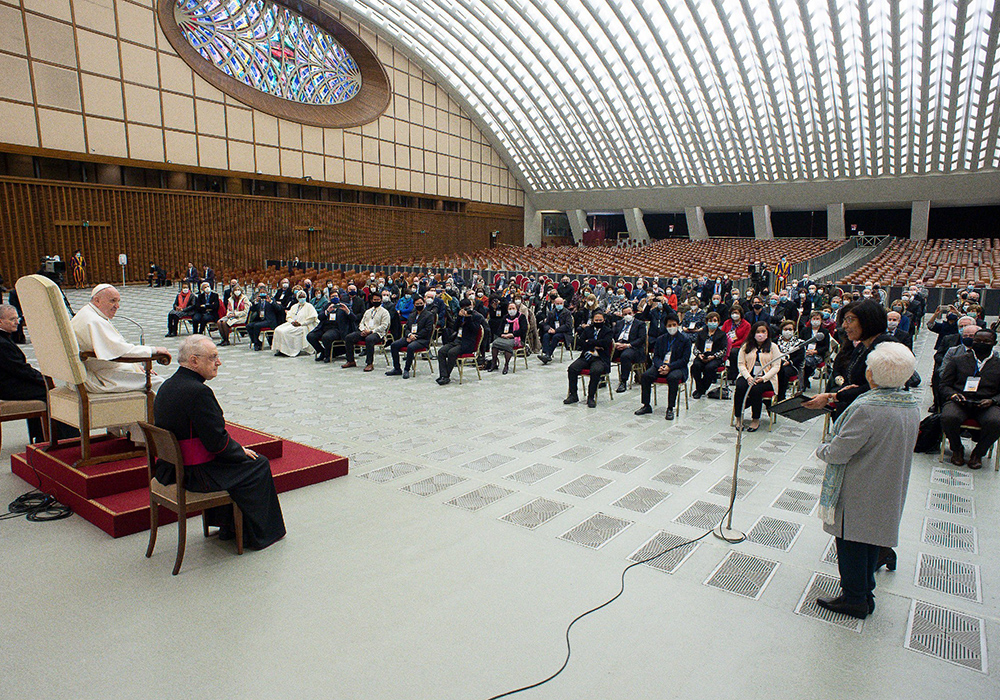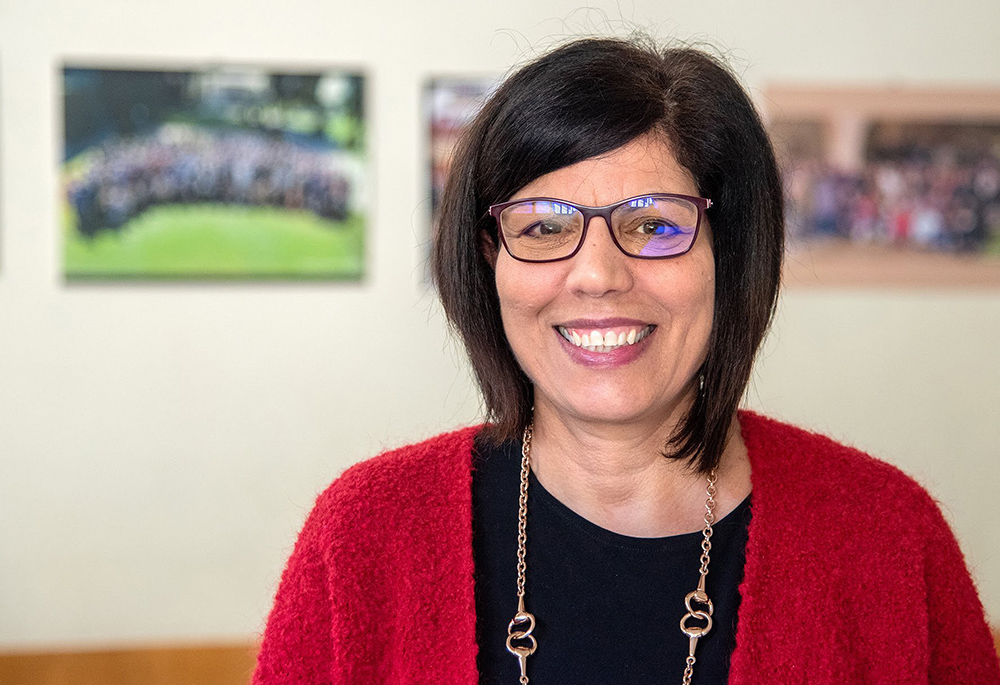
Pope Francis listens as Margaret Karram, the then-new president of the Focolare movement, speaks during an audience with participants in the general assembly of the Focolare movement, in the Paul VI hall Feb. 6, 2021, at the Vatican. The pope encouraged the movement to continue to grow in dialogue with the world today. (CNS/Vatican Media)
The Focolare movement, one of the largest lay organizations in the Catholic Church with members in countries across the world, published its first report on cases of sexual abuse of minors and vulnerable adults within its ranks on March 31.
The report, which was done internally and not by an independent firm, focuses on accounts of abuse received by the movement's Commission for the Welfare and Safeguarding of Members from 2014 to 2022. The findings indicate that from 1969-2012, 66 members of the global movement were accused of abusing 42 minors (29 between the ages of 14 and 18, and 13 under the age of 14) and 17 vulnerable adults.
Founded in 1943 by the Italian laywoman Chiara Lubich and approved by the Vatican in 1962, the Focolare movement has its headquarters in Rocca di Papa, near Rome, and is present in 182 countries. It was the first of a wave of so-called "new movements" much favored by Pope John Paul II that experienced remarkable growth during his reign. (Other such movements included the Neocatechumenal Way and Communion and Liberation).
Focolare members, known as focolarini, live in community, can be married, and take vows of chastity, poverty and obedience. Stefania Tanesini, a Focolare spokesperson, told NCR that vowed members include about 4,300 women and 2,540 men globally. The movement claims online that some 2 million people are more generally involved in its work.
This new internal report was released a year after the publication of an independent investigation into a former French consecrated member of the movement, Jean-Michel Merlin, who was responsible for abusing at least 37 boys since at least the 1960s.
Merlin, despite undergoing a criminal investigation in the 1990s for alleged sexual assault, had continued to have leading roles in the movement until 2016, when he was finally dismissed from Focolare. This was a major scandal, which forced Focolare president Margaret Karram and co-president Fr. Jesús Morán Cepedano to investigate the presence of sexual abuse throughout the movement.

Margaret Karram, president of the Focolare movement, is pictured in an undated photo. (CNS/Courtesy of Focolare)
Christophe Renaudin, the first person to formally accuse Merlin of abuse in 1994, under civil legislation in France, told NCR he considers the report "a smoke and mirrors operation to give the impression that something is being done but the reality is that the movement couldn't care less about the victims."
Renaudin spoke to NCR after meeting in-person with Karram and Morán in June 2023. Renaudin said he had asked Morán in 2016 to conduct an investigation about abuse within the movement, and waited years for a response.
Just as in the case of the church as a whole, this report makes it clear that it is possible that sexual abuse is systemic in the Focolare movement — as it has already revealed so many cases across the world. And with, at least so far, little research: just one year of work. In the case of Merlin, the independent firm undertaking the investigation, the UK-based GCPS Consulting, had to ask for more time because the time allotted for the investigation, also a year, was insufficient.
Although the internal report might give a good impression to readers, it provides only the numbers of those said to be abused. It omits the names of abusers, and the places and dates where and when the abuses happened. All we are told is that some of the cases date back to 1969. The sources of the allegations are not specified. Were they dusted off from files where they had deliberately been hidden for decades?
Advertisement
Karram and Morán did not respond to repeated requests for comment for this article. The Vatican's Dicastery for Laity, Family and Life, the office responsible for lay movements, also did not respond to requests for comment.
According to the GCPS report, "The Movement for a long time was more concerned with protecting the perpetrators, and thereby its own reputation, rather than supporting the victims. In this way, [Jean Michel Merlin] benefited for years from a system protecting him; at the same time, the Focolare Movement systematically failed the victims." The report also speaks of "reported cases of abuse including sexual, emotional, spiritual, and financial" abuse.
The report quotes a witness who explained how Merlin "was seducing the parents, he was the family friend, the confidant, sometimes a sponsor." According to GCPS, "Profiles of perpetrators [in all forms of abuse in the Movement] reported by the different individuals are often similar to JMM - charismatic people idolized by others, seen as central, untouchable, morally irreproachable, and trustworthy. The different situations described follow similar patterns of abuse of power, psychological dependence and adoration."
Just prior to the release of the Focolare abuse report, one of Pope Francis' major reforms for how the Vatican handles cases of abuse, the motu proprio Vos Estis Lux Mundi, was made permanent on March 25.
The law, which outlines the procedure for accusations of abuse and mishandling or cover-ups of such cases by bishops or other leaders in the church, was also updated. One of the most important changes is that the law now also applies to Vatican-approved lay associations.
The reason for this change was likely due in part to the scandal surrounding Jean Vanier, the founder of the L'Arche Community, who for years had been regarded in the church as a living saint. After his death, evidence emerged that Vanier had been part of a ring of sex abusers in the French Catholic Church.
Doubtless the case of Merlin in France was also taken into consideration in updating the motu proprio. Vos Estis takes a strong line on cases where leaders of lay movements have covered up abuse, stating that these leaders would be "punished."
But the Focolare report on abuse, as it was published in March, effectively ensures that such cover-ups cannot be identified.
In response to questions about why the report does not identify the names of alleged abusers, Fr. Joachim Schwind, head of communications for the Focolare movement, told NCR: "We did not give names to guarantee the privacy of the people involved. We want transparency, but also to safeguard everyone's rights."
But whose privacy and whose rights? This should certainly apply to the abused — but the abusers? How many such cases still exist in the movement? How many predators still operate freely in their large youth congresses, while young people and families remain unaware of the dangers?
Vos Estis addresses the cover-up of abuse cases by Catholic leaders. But such cover-up is also a serious crime in civil law in many countries, and can make Catholic leaders accessories to the abuse committed by perpetrators.
It is significant that Francis himself — who has been considerably more critical of Focolare and similar movements in contrast to the unbridled, possibly reckless, enthusiasm of predecessors John Paul II and Benedict XVI — told Focolare leaders during a private audience in February 2021 that "avoidance of all self-absorption, which never comes from the good spirit, is our hope for the whole Church: to beware of self-centeredness, which always leads to defending the institution to the detriment of individuals, and which can also lead to justifying or covering up forms of abuse."







